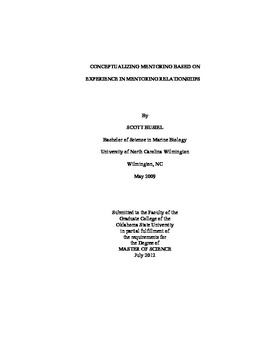| dc.contributor.advisor | Mendez, Jesse P. | |
| dc.contributor.author | Busiel, Scott Raymon | |
| dc.date.accessioned | 2014-04-16T03:11:26Z | |
| dc.date.available | 2014-04-16T03:11:26Z | |
| dc.date.issued | 2012-07-01 | |
| dc.identifier.uri | https://hdl.handle.net/11244/9734 | |
| dc.description.abstract | The purpose of this qualitative study was to explore, using the interviews of six participants, whether one's understanding of the concepts of mentoring and the mentoring experience are influenced by prior experience in mentoring relationships. The interviews of the mentors and protgs were used to explore and better understand their level of development through significant relationships. This research was also conducted to add further research and provide context for future research in mentoring literature. In order to obtain this information, three undergraduate students who worked in Housing and Residential Life and three graduate students/professional staff members within Housing and Residential Life were purposefully selected to participate in the study based on their willingness to complete the consent form and upon their completion of a demographic information form. A 60-minute, semi-structure interview took place to help the researcher better understand the following question: How have perceptions of previous mentoring experiences shaped the participants and their learned leadership approaches? Following the interviews, the data was analyzed around Jacobi's (1991) literature on outcomes of mentoring experiences. Through this, a few themes emerged: All participants displayed a thorough understanding of the three components to mentoring relationships, various characteristics (some consistent amongst the mentors and protgs, some disparate) emerged on what it meant to be a successful mentor and protg, the age of the mentor became a point of comparison as a majority of protgs clarified that a mentor must be older, none of the protgs participated in a formal mentoring relationship while all mentors have been a part of this experience, and all participants indicated the importance of mutual learning. From this information, the researcher created recommendations for future studies. For one, a longitudinal study would be helpful in measuring learning through mentoring relationships and participants should be collected from formal programs. This would be able to effectively gauge Zachary's (2000) phases of mentoring and determine accuracy. | |
| dc.format | application/pdf | |
| dc.language | en_US | |
| dc.publisher | Oklahoma State University | |
| dc.rights | Copyright is held by the author who has granted the Oklahoma State University Library the non-exclusive right to share this material in its institutional repository. Contact Digital Library Services at lib-dls@okstate.edu or 405-744-9161 for the permission policy on the use, reproduction or distribution of this material. | |
| dc.title | Conceptualizing Mentoring Based on Experience in Mentoring Relationships | |
| dc.type | text | |
| dc.contributor.committeeMember | Mir, Shabana | |
| dc.contributor.committeeMember | Wanger, Steve | |
| osu.filename | Busiel_okstate_0664M_12300.pdf | |
| osu.college | Education | |
| osu.accesstype | Open Access | |
| dc.description.department | School of Teaching and Curriculum Leadership | |
| dc.type.genre | Thesis | |
| dc.subject.keywords | higher education | |
| dc.subject.keywords | mentor | |
| dc.subject.keywords | mentoring | |
| dc.subject.keywords | protege | |
| dc.subject.keywords | student affairs | |
